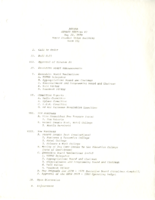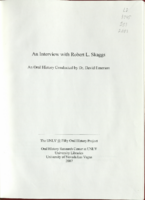Search the Special Collections and Archives Portal
Search Results
#71245: UNLV Hospitality in Healthcare Conference panel discussion entitled "Culture Building and Service Recovery" featuring Finley Cotrone, UNLV Harrah College, left, Donald Bowman, General Manager Mandarin Oriental (blue tie), moderator Jason Grattini (orange tie), Eddie Rivera, Executive Coach, Leadership Multiplier (gray jacket) and Eileen Moore (Regional President, Caesars (blue dress) on November 14, 2016, 2016 November 14
Level of Description
Archival Collection
Collection Name: University of Nevada, Las Vegas Creative Services Records (2010s)
Box/Folder: Digital File 01
Archival Component
Roberta Holton oral history interview
Identifier
Abstract
Oral history interview with Dr. Roberta Holton conducted by Wendy Park on November 20, 2006 for the Public School Principalship Oral History Project. In this interview, Holton reflects upon her 28-year career as a teacher and administrator with the Clark County School District. She discusses challenges that she faced in obtaining a teaching position, and some of her biggest challenges that she faced after being hired as a teacher and eventually principal. She also describes challenges that she faced in opening schools within the school district, and offers suggestions on how to be an effective principal and school administrator.
Archival Collection
Educational Equity Resource Center Records
Identifier
Abstract
The Educational Equity Resource Center (EERC) records contain material from workshops hosted by the EERC throughout Southern Nevada, especially Las Vegas, Nevada, between 1973 and 2000. The EERC aimed to provide teachers, students, and parents information on gender equity education, support, and training. Workshop materials include participant worksheets, surveys, brochures, instructional booklets, advertisements, correspondence, and evaluation forms. Workshop participants include K-12 students, postsecondary school students, educators, and parents. The records also include EERC organizational correspondence, reports, newsletters, publications, and resources detailing workshop and EERC funding, development, and promotion.
Archival Collection
Elsie Harris-Gibson oral history interview
Identifier
Abstract
Oral history interview with Elsie Harris-Gibson conducted by Wanda Renfrow on March 25, 2002 for the Public School Principalship Oral History Project. In this interview, Harris-Gibson reflects upon her 32-year career as a teacher and administrator with Nevada’s Clark County School District (CCSD) from the 1970s to the 2000s. She discusses her priority in being a fair leader, and the importance of fairness in school administrators. She describes her regular responsibilities and challenges as principal, as well as her working relationships with teachers and assistant principals. She also describes her experience with classroom-size reduction, standardized testing programs, and Reading Improvement Teacher programs.
Archival Collection
Eva White oral history interview
Identifier
Abstract
Oral history interview with Eva White conducted by Jan Hagan on August 02, 2001 for the Public School Principalship Oral History Project. In this interview, White reflects upon her career as a teacher and administrator with Nevada’s Clark County School District (CCSD). She discusses her upbringing and the influence that her family had on her decision to become a teacher. She reflects upon her early experiences as a new teacher, working at a school near Nellis Air Force Base, and how she crafted her approach to education. She also discusses school integration, standardized testing, mentorships, and home-school learning gaps.
Archival Collection

Transcript of interview with Ann Clark Kanie by Lois Goodall, March 20, 2014
Date
Archival Collection
Description
Born and raised in Las Vegas, Ann Clark Kanie, elementary teacher, exemplifies the love of teaching in Clark County. Her mother, Marie Larson Clark Dane, taught elementary school at Lincoln Elementary School for 35 years. Ann attended Lincoln Elementary with her mother, Jim Bridger Junior High, Rancho, and then graduated from UNLV in elementary education. She also began teaching, like her mother, at Lincoln Elementary in North Las Vegas but later changed to Wasden Elementary which she obviously admires. Ann recalls growing up in Las Vegas and the fun that she and her friends enjoyed: participating in Helldorado Week, renting horses at Tule Springs or Old Nevada, riding bikes to the Meadows Mall and the Black Hole at the Springs Preserve, sliding down Becker’s Super Slide on Decatur Avenue, watching Disney movies at the Huntridge Theater, playing miniature golf and ice skating at Commercial Center, and going to Lake Mead and investigating the Potosi Mines. Ann married, continued teaching at Wasden. Her only son has chosen to follow his mother’s footsteps, graduated from UNLV in English education and teaches and coaches at Cimarron-Memorial High School. Even though she admits that teaching has become a very difficult, time-consuming job, it is obvious that Ann Kanie loves educating students and has passed this love on to her son.
Text

Meeting minutes for Consolidated Student Senate, University of Nevada, Las Vegas, May 22, 1979
Date
Archival Collection
Description
Text
Gretchen Braner oral history interview
Identifier
Abstract
Oral history interview with Gretchen Braner conducted by Stacey Skidmore on November 24, 2009 for the Public School Principalship Oral History Project. In this interview, Braner reflects back on her career as a teacher and administrator with the Clark County School District from the 1980s to the early 2000s. Braner discusses the process by which she trained to become a school administrator, which portions of the training were most beneficial, and the importance of life experiences in shaping her philosophy of education. She describes her regular job responsibilities, and explains the importance of balancing work priorities to avoid burnout. She also discusses the importance of fostering relationships with students and staff to make school administration meaningful.
Archival Collection

Transcript of interview with Robert L. Skaggs by Dr. David Emerson, May 06, 2006
Date
Archival Collection
Description
Text

Transcript of interview with Jerome "Jerry" Jay Vallen by Lisa Gioia-Acres, October 2, 2007
Date
Archival Collection
Description
Text
